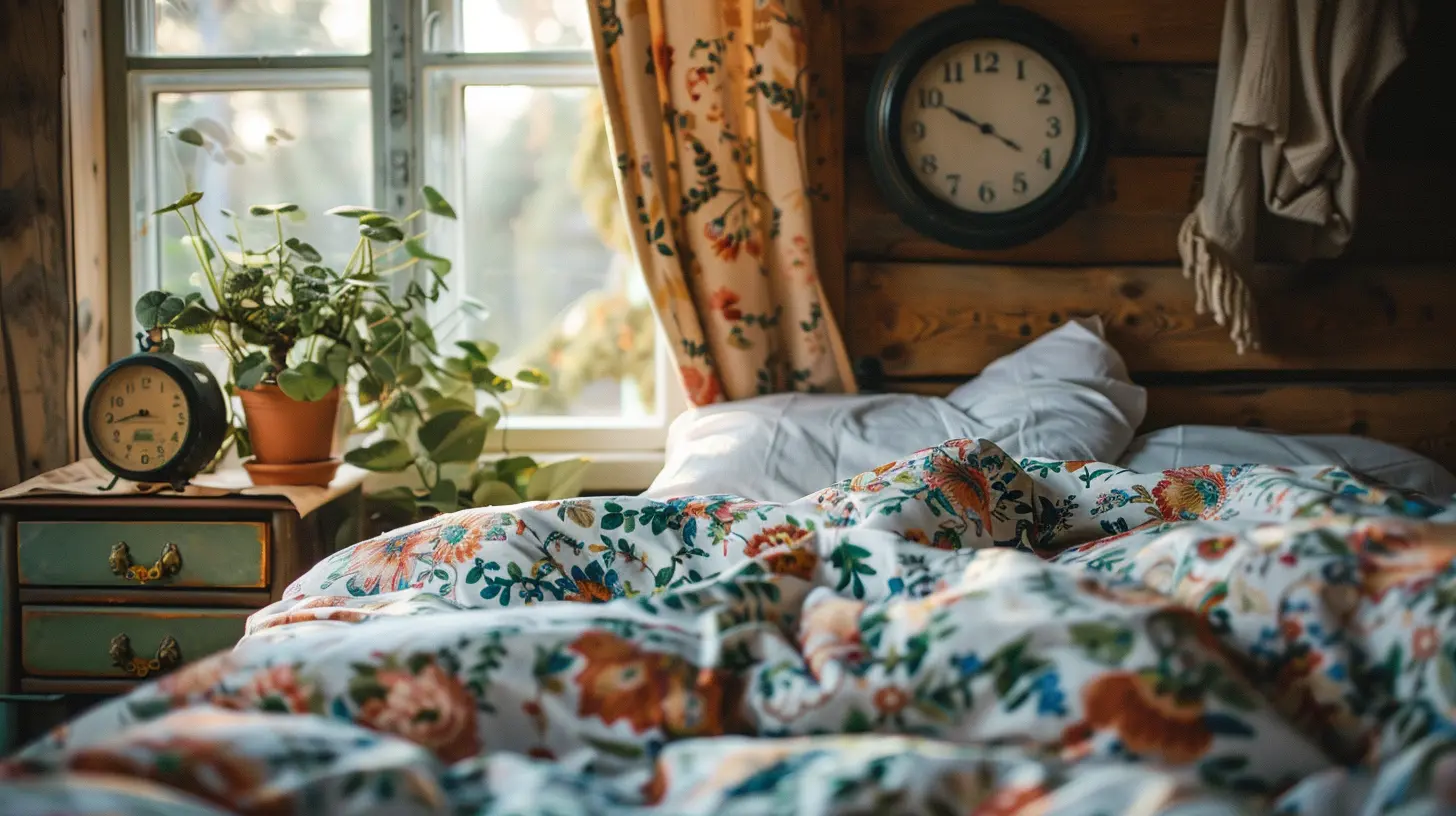How to Create a Sleep-Restoring Bedtime Routine
13 December 2024
Are you tired of tossing and turning every night, staring at the ceiling as the clock ticks away? Sleep deprivation can feel like an uphill battle, one that leaves you groggy, irritable, and unfocused the next day. But here's the thing—your bedtime routine could be the secret weapon you need to reclaim those precious Zzzs. With a little intention and effort, you can establish a calming pre-sleep ritual that tells your body, "Hey, it's time to power down." Ready to dive in? Let’s chat about how to create a sleep-restoring bedtime routine that you’ll actually look forward to.
Why Is a Bedtime Routine So Important?
Before jumping into the "how," let’s talk about the "why." Think of your bedtime routine as a runway for landing your sleep plane smoothly. Your body thrives on consistency and rhythm. When you establish habits that signal the day is winding down, your brain releases melatonin, the “sleep hormone,” to cue your body to relax. This makes falling—and staying—asleep easier.Without a solid bedtime routine, your brain can feel like it’s in overdrive. Ever tried to fall asleep after scrolling social media or answering work emails late at night? It’s like trying to park a racecar going 100 miles per hour. But with the right routine in place, you're helping your body ease into sleep-mode like a slow, gentle slide into a pool. 
Setting the Stage: How to Prepare for Success
1. Stick to a Schedule
This might sound boring, but consistency is your new best friend. Wake up and go to bed at the same time every day—even on weekends. Yes, even when those Saturday night Netflix marathons tempt you to stay up late! Your internal clock, also known as your circadian rhythm, loves predictability.When you stick to a schedule, your body learns when it’s time to sleep and when it’s time to wake up. Think of it like setting an automatic timer for your brain—it just works.
2. Make Your Bedroom a Sleep Sanctuary
Let’s be real—your environment can make or break your sleep quality. Your bedroom should feel like a cocoon of calm, not a multi-functional chaos zone. First off, invest in a good mattress and comfy pillows. You spend nearly a third of your life in bed, so it’s worth it!Keep clutter to a minimum, and consider dimming the lights an hour before bed. Lighting matters more than you think. Bright lights, especially blue light from screens, can mess with your melatonin production. Instead, opt for warm, soft lighting to create a cozy, sleep-ready vibe.
3. Limit Screen Time
We all love a good TikTok binge, but here’s the truth: screens are sleep’s arch-nemesis. The blue light emitted by phones, computers, and TVs tricks your brain into thinking it’s daytime, delaying your ability to wind down.Try a digital detox at least 30–60 minutes before bed. Don’t worry; the world won’t end if you log off Instagram for a bit! Instead, swap the screen time for something more soothing, like reading a book (a real one, not on a tablet) or journaling. 
Crafting Your Perfect Bedtime Routine
Now that your sleep space is prepped, let’s talk about the steps of a simple but effective bedtime routine. The goal here is to create a series of signals that tell your body, “It’s time to chill.”1. Start with a Wind-Down Activity
Not sure how to transition from your busy day to relaxation? Choose a wind-down activity that calms your mind. It could be something as simple as sipping herbal tea, meditating, or taking a warm bath. Warm baths aren’t just relaxing—they actually help lower your body temperature afterward, a signal to your brain that it’s bedtime.2. Reflect with Gratitude
This might sound cheesy, but trust me, it helps. Spend a few minutes reflecting on things you’re grateful for. It could be as small as enjoying a delicious dinner or as big as a personal win at work. Gratitude journaling not only reduces stress but also helps you go to bed with a positive mindset.3. Practice Relaxation Techniques
Not a fan of journaling? No worries! Try relaxation techniques like deep breathing exercises or progressive muscle relaxation. With deep breathing, you’re essentially telling your nervous system to "chill out." Inhale for four counts, hold for four, and exhale for six. Feel that tension melting away?Another option is progressive muscle relaxation, where you tense and then release each muscle group in your body, starting from your toes and working your way up. It’s like giving your body a mini massage without even moving.
4. Use Aromatherapy
Here’s a little extra flair for your routine: essential oils. Scents like lavender, chamomile, and cedarwood are known to promote relaxation. You can use a diffuser, spray it on your pillow, or even rub a bit on your wrists before bed. It’s like letting your sense of smell join the relaxation party.5. Create a To-Do List—For Tomorrow
If your mind feels like a hamster wheel spinning with tomorrow’s tasks, offload those thoughts into a to-do list. Writing everything down can help you feel organized and at ease, letting your brain know it’s okay to shut off for now.6. End with Light Reading or Soothing Music
Avoid anything too stimulating (no murder mysteries or work emails). Go for light reading—a novel, poetry, or even inspirational quotes. Alternatively, soothing music or sleep meditations can lull you into relaxation. Just keep the volume low and avoid anything with loud beats.
What to Avoid
Building good habits is important, but breaking bad ones is just as crucial. Here are a few things you might want to steer clear of in your bedtime routine:- Late-Night Snacking: While a light snack can be fine, heavy or greasy foods before bed can give you heartburn or disrupt your sleep.
- Caffeine After Mid-Afternoon: Coffee, tea, and even chocolate can stay in your system for hours, keeping you wired well into the night.
- Alcohol: Sure, a glass of wine might make you feel drowsy, but alcohol disrupts the sleep cycle, leaving you more tired in the morning.
Trial and Error: Finding What Works for You
Remember, creating the perfect bedtime routine isn’t a one-size-fits-all deal. It’s about experimenting to figure out what feels natural and relaxing for you. Maybe you love journaling but can’t stand meditating, or perhaps you’d rather listen to an audiobook than read. That’s totally fine! The point is to create a consistent rhythm that works for your body and helps you wind down.The Rewards of a Sleep-Restoring Routine
When you commit to a bedtime routine, you’re not just improving your sleep—you’re also setting yourself up for better overall health. Adequate sleep boosts your energy, mood, and mental clarity. It even strengthens your immune system and helps your body recover from the day’s stresses.Think of it this way: sleep is the ultimate act of self-care. By prioritizing your rest, you’re giving yourself a gift that pays off big time in every area of your life.
Your Turn to Take Action
Alright, now it’s time to put all this into practice. Your best night’s sleep could be just a few simple steps away. Start small, be consistent, and don’t be afraid to tweak your routine until it feels just right. Soon enough, you’ll find yourself drifting off into dreamland effortlessly. Sweet dreams, my friend!all images in this post were generated using AI tools
Category:
Sleep DisordersAuthor:

Angelo McGillivray
Discussion
rate this article
13 comments
Leona McAleer
Transform your nights and rejuvenate your days! Embrace the power of a restful bedtime routine—your path to better sleep and vibrant health starts here. Dream big, sleep well!
April 8, 2025 at 4:00 AM

Angelo McGillivray
Thank you! A restful bedtime routine is essential for rejuvenating both sleep and health. Excited to share these tips!
Elena Montgomery
Establishing a consistent bedtime routine is crucial for improving sleep quality. Integrating relaxation techniques and minimizing screen time can significantly enhance restorative sleep and overall well-being.
March 12, 2025 at 3:42 PM

Angelo McGillivray
Absolutely! A consistent bedtime routine that includes relaxation techniques and limited screen time is key to better sleep and overall health. Thank you for your insight!
Olympia Estes
Thank you for sharing these valuable tips! A consistent bedtime routine truly makes a difference in improving sleep quality. Looking forward to trying these suggestions!
February 7, 2025 at 6:02 AM

Angelo McGillivray
Thank you for your kind words! I'm glad you found the tips helpful—wishing you restful nights ahead!
Ulrich McIlroy
Creating a sleep-restoring bedtime routine is essential for enhancing overall well-being. Establish a consistent sleep schedule, limit screen time before bed, and incorporate relaxation techniques like reading or meditation. Small changes can significantly impact your sleep quality, leading to better health and increased daily productivity. Sweet dreams!
February 1, 2025 at 6:02 PM

Angelo McGillivray
Thank you for your insightful comment! I completely agree that a consistent bedtime routine can greatly improve sleep quality and overall well-being. Sweet dreams to you too!
Dean McWain
Great insights! Establishing a consistent bedtime routine is essential for improving sleep quality and overall well-being. Thank you for sharing!
January 27, 2025 at 12:34 AM

Angelo McGillivray
Thank you for your kind words! I'm glad you found the insights helpful. A consistent bedtime routine can truly make a difference!
Rosalyn Monroe
Sweet dreams start here!
January 19, 2025 at 5:30 PM

Angelo McGillivray
Thank you! Creating a restful routine is essential for sweet dreams! 🌙
Jackson Fisher
Consistency is key; prioritize relaxation to improve your sleep quality.
January 11, 2025 at 4:48 AM

Angelo McGillivray
Absolutely! Consistency and relaxation are crucial for enhancing sleep quality. Building a calming bedtime routine can significantly help.
Daphne Beck
“Creating a bedtime routine is like prepping for a big date: dim lights, comfy clothes, and maybe a glass of warm milk—just don’t forget to brush your teeth!”
January 7, 2025 at 3:53 AM

Angelo McGillivray
Absolutely! A cozy bedtime routine sets the perfect mood for restful sleep—just like prepping for a big date!
Hugo Palmer
“Creating a bedtime routine is like training for a marathon—except your only competition is the snooze button! Just remember, if counting sheep doesn't work, it's perfectly acceptable to count chocolate bars instead. Sweet dreams and even sweeter snacks!”
December 31, 2024 at 3:34 AM

Angelo McGillivray
Absolutely! A fun perspective on bedtime routines—finding joy in the process can make all the difference for a restorative night’s sleep! Sweet dreams!
Isabella Wagner
This article offers such insightful tips for enhancing our bedtime routines! I'm intrigued to explore how small changes can lead to better sleep quality. Can't wait to try out some new strategies—restful nights await! Thanks for sharing these valuable ideas!
December 27, 2024 at 4:02 AM

Angelo McGillivray
Thank you for your kind words! I’m glad you found the tips helpful—wishing you many restful nights ahead!
Parisa McMeekin
A sleep-restoring bedtime routine transcends mere habit; it’s an invitation to nurture oneself. Embracing this ritual fosters a sanctuary of peace, allowing the mind and body to reconnect, heal, and rejuvenate for the day ahead.
December 25, 2024 at 4:01 AM

Angelo McGillivray
Thank you for capturing the essence of a bedtime routine so beautifully! Nurturing ourselves through these rituals is essential for restorative sleep and overall well-being.
Layla Montgomery
Thanks for sharing these fantastic tips! Establishing a calming bedtime routine is so important for restful sleep. Can’t wait to try these ideas and improve my evenings!
December 17, 2024 at 6:01 PM

Angelo McGillivray
You're very welcome! I'm glad you found the tips helpful. Wishing you peaceful and restorative evenings ahead!
Felix Sullivan
A well-structured bedtime routine enhances sleep quality by promoting relaxation and signaling the brain to wind down. Incorporating consistent sleep times, calming activities, and a sleep-conducive environment is essential.
December 14, 2024 at 5:57 AM

Angelo McGillivray
Thank you for highlighting the importance of a structured bedtime routine! Consistency and relaxation are key to improving sleep quality.
MORE POSTS

How Fermented Foods Can Transform Your Gut Health

The Effects of Prescription Medications on Your Skin’s Sun Sensitivity

Simple and Delicious Recipes for a Gluten-Free Lifestyle

How Mind-Body Exercises Like Yoga Improve Mental Clarity

How Virtual Reality May Revolutionize Chronic Pain Treatment

Understanding the Benefits of a Midday Nap for Brain Power

How Cardio Supports Brain Health and Cognitive Function

Can’t Commit to the Gym? Here’s How to Stay Active at Home

Fresh and Vibrant Salads That Are Anything but Boring